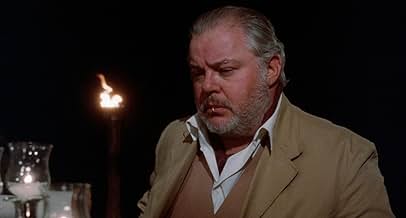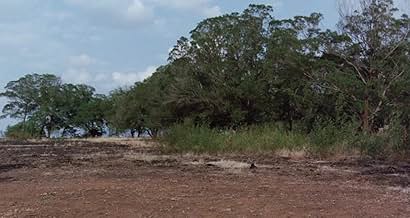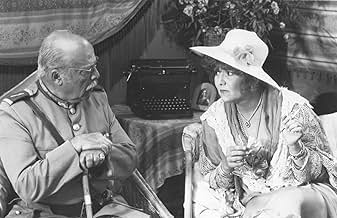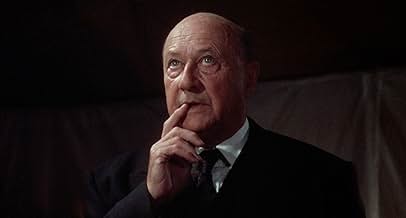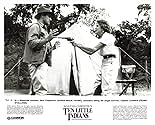CALIFICACIÓN DE IMDb
4.7/10
1.8 k
TU CALIFICACIÓN
Diez personas son invitadas a un safari africano, solo para descubrir que alguien misterioso los está matando uno por uno. ¿Podría ser uno de ellos el asesino?Diez personas son invitadas a un safari africano, solo para descubrir que alguien misterioso los está matando uno por uno. ¿Podría ser uno de ellos el asesino?Diez personas son invitadas a un safari africano, solo para descubrir que alguien misterioso los está matando uno por uno. ¿Podría ser uno de ellos el asesino?
- Dirección
- Guionistas
- Elenco
Sarah Maur Ward
- Vera Claythorne
- (as Sarah Maur Thorp)
Candice Hillebrand
- Schoolgirl at Train Window
- (sin créditos)
Bill Mitchell
- Mr. U.N. Owen
- (sin créditos)
- Dirección
- Guionistas
- Todo el elenco y el equipo
- Producción, taquilla y más en IMDbPro
Opiniones destacadas
I find it quite hard to review this film, it's one of those I got into as a kid, and it's always difficult to be mean about your childhood films.
The book, is perhaps my all time favourite novel, so it's pretty difficult to do it badly, or is it? There have been several adaptations, 1945, 1965 and 1974's versions were all different, but no matter how much they veered from the script they all managed to retain the suspense and sense of claustrophobia, aided both by direction, and more basically the locations. The Jungle setting doesn't really work on the same level somehow.
The sets look pretty cheap, as do some of the costumes, Frank Stallone, Brenda and Sarah look pretty tatty in some parts.
It's not all doom and gloom though, some of the acting is rather good, and whilst I don't particularly like some of the characters the acting is not at fault. Donald Pleasence is the high point, he is particularly good, Herbert Lom is good too, even though I loathed his character. I thought Sarah Maur Thorp was fair as Vera, she had an English delicacy.
Some actors were rather badly cast, firstly, Yehuda Efroni is actually irritating as the Doctor, I couldn't wait for him to go. As for Frank Stallone I can think of no other reason for him to be there other then for his beefy looks, he does lots of intense pouts, but adds little. The Rogers were the worst culprits for overacting.
I struggle to believe how 'Owen' could have committed some of the murders, they seem a little far fetched, Mr Rogers in particular, although I enjoyed the finale, it's well acted and there is a sense of terror.
I long for the day when someone sticks to the original ending, if only a producer would have the bottle.
It's a fun film, a bit cheap, but some interesting surprises in store for the first time viewer, I still enjoy it despite its flaws 5/10
The book, is perhaps my all time favourite novel, so it's pretty difficult to do it badly, or is it? There have been several adaptations, 1945, 1965 and 1974's versions were all different, but no matter how much they veered from the script they all managed to retain the suspense and sense of claustrophobia, aided both by direction, and more basically the locations. The Jungle setting doesn't really work on the same level somehow.
The sets look pretty cheap, as do some of the costumes, Frank Stallone, Brenda and Sarah look pretty tatty in some parts.
It's not all doom and gloom though, some of the acting is rather good, and whilst I don't particularly like some of the characters the acting is not at fault. Donald Pleasence is the high point, he is particularly good, Herbert Lom is good too, even though I loathed his character. I thought Sarah Maur Thorp was fair as Vera, she had an English delicacy.
Some actors were rather badly cast, firstly, Yehuda Efroni is actually irritating as the Doctor, I couldn't wait for him to go. As for Frank Stallone I can think of no other reason for him to be there other then for his beefy looks, he does lots of intense pouts, but adds little. The Rogers were the worst culprits for overacting.
I struggle to believe how 'Owen' could have committed some of the murders, they seem a little far fetched, Mr Rogers in particular, although I enjoyed the finale, it's well acted and there is a sense of terror.
I long for the day when someone sticks to the original ending, if only a producer would have the bottle.
It's a fun film, a bit cheap, but some interesting surprises in store for the first time viewer, I still enjoy it despite its flaws 5/10
Ten people are invited on a safari in Africa. One by one they are killed off. Clearly one of them is the murderer. But which one?
Fairly weak adaptation of the Agatha Christie novel. Not at all intense, and the intrigue is very diluted. Pretty much a paint-by- numbers rendition. Bland, unimaginative direction.
Consequently, the actors appear to be sleep-walking for most of this. No spark at all. Dead giveaway that this isn't exactly going to be Citizen Kane - it stars Frank Stallone, Sylvester's even less talented brother.
Fairly weak adaptation of the Agatha Christie novel. Not at all intense, and the intrigue is very diluted. Pretty much a paint-by- numbers rendition. Bland, unimaginative direction.
Consequently, the actors appear to be sleep-walking for most of this. No spark at all. Dead giveaway that this isn't exactly going to be Citizen Kane - it stars Frank Stallone, Sylvester's even less talented brother.
The 1989 film has some good points, but, unlike the 1945, 1965, and 1974 versions, it grows less enjoyable with each viewing. Everything about it seems low-budget. The cast and script are undistinguished. The set is drab. The clothes look like cheap costumes. The plot takes too long to get going. Once it does, it unfolds well at first, with the early deaths resembling accidents. And, bettering all prior versions, the ending is dramatic, conveys murderous host Owen's menace and lunacy, and most fully explains Owen's behavior.
Overall, however, the storytelling is inept. Too much is out of Owen's control, such as natives cutting down the basket that carries people down from the cliff and Lombard repairing the radio. After the third death, someone abruptly announces without any discussion or reasoning that "Mr. Owen is one of us." Unlike the other versions, the characters engage in no deductive reasoning or survival techniques.
The story drags. Only making matters worse are cheap, forced attempts to gin up suspense. These include the camera suddenly coming up short on characters; a character acting "awfully nervous" for no reason; and pratfall-type death scenes, with a body tumbling down from on top of a tent, another toppling out of a closet, mouth gaping, and another slumping forward with an ax in the back of the head.
Touches that made earlier versions entertaining are botched in 1989. The other films recite the full nursery rhyme up front, creatively playing it on the piano. But this script dribbles the rhyme out line by line upon each murder. Instead, it chooses to play "Mad Dogs and Englishmen," an annoying, madcap, out-of-place Noel Coward song with no apparent connection to Christie or appropriateness to this adaptation, which has so few British characters. This film makes an embarrassing hash of the scene in which the phonograph record is played accusing each person of a past crime. Repeatedly, the person whose name is unexpectedly about to be called next happens to pipe up with some exaggerated utterance, on cue, right before being named.
The 1989 film fails to discuss some past crimes at all (doctor, judge, Lombard). It distorts others (Blore, Marshall), to no good effect. In place of Christie's subtle crime of withheld care, Rodgers merely refers to an old lady in his care who "died of a massive stroke." In the film, Marston refers to a "couple running out in front of his car," without any mention of them being newlyweds or of him driving fast and drunk. The film dumbs down the book's most complex, interesting past crime to a bland reference to a child in Vera's care drowning.
All the good lines from other versions are gone in 1989, like "a feeling that some sort of macabre joke is being played on us," "game of the mind." In 1989, other than Owen's line "My own private big game hunt," there are just limp banalities ("The devil is among us"; Our duty, that's all any of us can hope to do"; "I never bet"; "When we get out of here, I'm going to teach you to shoot straight") or lines memorable only for making you cringe (judge, "I left immediately...to relieve myself"; Lombard to Vera, "Feel it, smell it," about gun).
In 1989, the casting and acting, strong points in past adaptations, go badly awry. An exception is Herbert Lom's delightfully dotty performance as the general, better than 1945, including a touching scene with Vera explaining his past. But Donald Pleasance is adrift, mostly acting detached and insipid, then suddenly erupting in a panic outburst or frantically pawing in a snuff box. Not until his final moments on screen does he play his character coherently and effectively.
Sarah Maur Thorp brings youthful energy and emotion to the role of Vera. But her acting becomes erratic and mechanical as she turns increasingly into a mere screaming hysteric, unlike June Duprez, who keeps a strong, intelligent presence during the 1945 film.
Brenda Vaccaro's uninspired, formless performance as actress Marshall consists of sighing, huffing, lounging around, and boozing. It is unbelievable that this plump, pampered lush would go on an African safari. Her only explanation? "I was invited. I received a letter in the post."
Blore's character has always been well-defined and well-acted before. But here, played by a bit-part TV character actor, he is just roly-poly, rough, loud, and sulky. His mumbled confession of his past crime is confused and miserably ineffective.
Marston, who rushes through a 2-second singing bit, the worst musical performance of any version, is a caricature of a fop. The film fails to place him in the context of a dissolute career or even mention his penchant for liquor and fast sportscars.
Paul Smith as Rodgers tries to let his hulking body do his acting for him, as Moira Lister, the wife, does with her shrill voice. He lumbers around scowling and bellowing laconically. She overacts as a loud, whiny motormouth. Their characters and relationship are not remotely believable.
Apparently, Frank Stallone's only qualification for Lombard was being a "hunk." His weak, vacant expressions and flat delivery are evident from his very first line. His acting is exemplified by the scene in which he shoves a pistol in Vera's face and cocks the trigger, oblivious that he has already started mouthing the line, "I'm sorry, I didn't mean to scare you." Stallone's constant, supposedly sly, cocky grins destroy any sense of suspense. His only explanation for being there: "Owen had already paid [a friend's] way out, so I came instead."
Worst of all, Yehuda Efroni ruins the important character of the doctor. His bizarre, introverted, bug-eyed portrayal lacks any air of authority, intellect, charm, or even social skills. Through a heavy accent, he either stammers or, like a snapping turtle, spits out snippets of inarticulate dialogue. At one point, he cackles, at another acts befuddled, for no reason at all. Unlike any prior version, the doctor has no rapport with any other character.
Overall, however, the storytelling is inept. Too much is out of Owen's control, such as natives cutting down the basket that carries people down from the cliff and Lombard repairing the radio. After the third death, someone abruptly announces without any discussion or reasoning that "Mr. Owen is one of us." Unlike the other versions, the characters engage in no deductive reasoning or survival techniques.
The story drags. Only making matters worse are cheap, forced attempts to gin up suspense. These include the camera suddenly coming up short on characters; a character acting "awfully nervous" for no reason; and pratfall-type death scenes, with a body tumbling down from on top of a tent, another toppling out of a closet, mouth gaping, and another slumping forward with an ax in the back of the head.
Touches that made earlier versions entertaining are botched in 1989. The other films recite the full nursery rhyme up front, creatively playing it on the piano. But this script dribbles the rhyme out line by line upon each murder. Instead, it chooses to play "Mad Dogs and Englishmen," an annoying, madcap, out-of-place Noel Coward song with no apparent connection to Christie or appropriateness to this adaptation, which has so few British characters. This film makes an embarrassing hash of the scene in which the phonograph record is played accusing each person of a past crime. Repeatedly, the person whose name is unexpectedly about to be called next happens to pipe up with some exaggerated utterance, on cue, right before being named.
The 1989 film fails to discuss some past crimes at all (doctor, judge, Lombard). It distorts others (Blore, Marshall), to no good effect. In place of Christie's subtle crime of withheld care, Rodgers merely refers to an old lady in his care who "died of a massive stroke." In the film, Marston refers to a "couple running out in front of his car," without any mention of them being newlyweds or of him driving fast and drunk. The film dumbs down the book's most complex, interesting past crime to a bland reference to a child in Vera's care drowning.
All the good lines from other versions are gone in 1989, like "a feeling that some sort of macabre joke is being played on us," "game of the mind." In 1989, other than Owen's line "My own private big game hunt," there are just limp banalities ("The devil is among us"; Our duty, that's all any of us can hope to do"; "I never bet"; "When we get out of here, I'm going to teach you to shoot straight") or lines memorable only for making you cringe (judge, "I left immediately...to relieve myself"; Lombard to Vera, "Feel it, smell it," about gun).
In 1989, the casting and acting, strong points in past adaptations, go badly awry. An exception is Herbert Lom's delightfully dotty performance as the general, better than 1945, including a touching scene with Vera explaining his past. But Donald Pleasance is adrift, mostly acting detached and insipid, then suddenly erupting in a panic outburst or frantically pawing in a snuff box. Not until his final moments on screen does he play his character coherently and effectively.
Sarah Maur Thorp brings youthful energy and emotion to the role of Vera. But her acting becomes erratic and mechanical as she turns increasingly into a mere screaming hysteric, unlike June Duprez, who keeps a strong, intelligent presence during the 1945 film.
Brenda Vaccaro's uninspired, formless performance as actress Marshall consists of sighing, huffing, lounging around, and boozing. It is unbelievable that this plump, pampered lush would go on an African safari. Her only explanation? "I was invited. I received a letter in the post."
Blore's character has always been well-defined and well-acted before. But here, played by a bit-part TV character actor, he is just roly-poly, rough, loud, and sulky. His mumbled confession of his past crime is confused and miserably ineffective.
Marston, who rushes through a 2-second singing bit, the worst musical performance of any version, is a caricature of a fop. The film fails to place him in the context of a dissolute career or even mention his penchant for liquor and fast sportscars.
Paul Smith as Rodgers tries to let his hulking body do his acting for him, as Moira Lister, the wife, does with her shrill voice. He lumbers around scowling and bellowing laconically. She overacts as a loud, whiny motormouth. Their characters and relationship are not remotely believable.
Apparently, Frank Stallone's only qualification for Lombard was being a "hunk." His weak, vacant expressions and flat delivery are evident from his very first line. His acting is exemplified by the scene in which he shoves a pistol in Vera's face and cocks the trigger, oblivious that he has already started mouthing the line, "I'm sorry, I didn't mean to scare you." Stallone's constant, supposedly sly, cocky grins destroy any sense of suspense. His only explanation for being there: "Owen had already paid [a friend's] way out, so I came instead."
Worst of all, Yehuda Efroni ruins the important character of the doctor. His bizarre, introverted, bug-eyed portrayal lacks any air of authority, intellect, charm, or even social skills. Through a heavy accent, he either stammers or, like a snapping turtle, spits out snippets of inarticulate dialogue. At one point, he cackles, at another acts befuddled, for no reason at all. Unlike any prior version, the doctor has no rapport with any other character.
You could spend hours thinking up reasons as to why Harry Alan Towers (or Peter Wellbeck, as he is sometimes credited) has stuck with "Ten Little Indians" through 3 remakes. It can't be the money. Maybe he wanted to travel, and decided what the heck, as long as I'm here, why don't I film another version of "Ten Little Indians". Or, maybe he feels a need to remake the movie once every 10 or so years. You could fault him for causing people to lose interest in the story, because most reviewers think the remakes were awful. I don't fault him. If it wasn't for Towers, I would not have been able to see my favorite murder mystery filmed with some of my favorite actors, including Herbert Lom, Richard Attenbourogh, Donald Pleasence, and Oliver Reed. Most people think this is the worst of the versions. Personally, I enjoyed it, and I will tell you why. It isn't the best. Rene Clair's "And Then There Were None" is the best. I won't for a minute say that it isn't. But I still found enjoyable things in this movie. I'll begin with the cast:
Donald Pleasence: Excellent casting. When I read the book(which I did before I saw the movie) He is Exactly what I pictured the Judge would look like. And I thought that Pleasence gave a strong performance. This boost my rating of this version.
Brenda Vaccaro: She was okay. I didn't like her or dislike her. she doesn't add or subtract anything form my rating.
Frank Stallone: I'm sorry, but Stallone was a bad choice. While I won't say that Stallone is a bad actor, since I haven't seen him in any other movies, I did not think he was good in this movie. He had no charisma. Louis Hayward gave a good performance. Hugh O'Brian(When the role was americanized) gave a good performance. Oliver Reed(though contrary to most reviews) gave a good preformance. Stallone does not. This does subtract from my rating.
Herbert Lom: Here's where my review becomes biased. I could never say anything bad about Herbert Lom. He has kept me more than entertained thoughout the Pink Panther series. And he is Great as the General. He looked, and portrayed the role exactly as it needed to be portrayed. However, he is not given enough to do. Lom has a great talent when he is allowed to showcase it, and Towers does not give him much of a chance. I wish that Towers would have cast him as Blore, or the Doctor(which he played in the 1975 version) or heck, even the Judge. I personally don't think his age would have been a problem(You should see him in "Son of the Pink Panther"). But sadly, Towers did not. however, his being cast in this version ups my rating.
Sarah Maur Thorp: She was good. I think she gave a stronger performance than Brenda Vaccaro did to!
Warren Berlinger: I thought he was nicely cast as well. He gives a strong performance, and I enjoyed him in this film.
Yehuda Efroni: He wasn't bad, but he wasn't good. I have mixed feelings. It would have been interesting to see what Lom would have done with the character if he had been in the role.
Neil McCarthy: I liked him. For having a small role, I thought McCarthy's performance was one of the best of the bunch. Due to that fact, I enjoyed the character.
Moria Lister: She was average. She said her lines and got out of there. (And I was glad when she did!)
Paul L. Smith: Overall, He was okay. He did have a tendancy to overact though.
Overall, despite some less than spectacular performances, I enjoyed the film. I didn't mind the setting being Africa either. If you like the story, you should see this version.
I give it a 8 out of ten
Donald Pleasence: Excellent casting. When I read the book(which I did before I saw the movie) He is Exactly what I pictured the Judge would look like. And I thought that Pleasence gave a strong performance. This boost my rating of this version.
Brenda Vaccaro: She was okay. I didn't like her or dislike her. she doesn't add or subtract anything form my rating.
Frank Stallone: I'm sorry, but Stallone was a bad choice. While I won't say that Stallone is a bad actor, since I haven't seen him in any other movies, I did not think he was good in this movie. He had no charisma. Louis Hayward gave a good performance. Hugh O'Brian(When the role was americanized) gave a good performance. Oliver Reed(though contrary to most reviews) gave a good preformance. Stallone does not. This does subtract from my rating.
Herbert Lom: Here's where my review becomes biased. I could never say anything bad about Herbert Lom. He has kept me more than entertained thoughout the Pink Panther series. And he is Great as the General. He looked, and portrayed the role exactly as it needed to be portrayed. However, he is not given enough to do. Lom has a great talent when he is allowed to showcase it, and Towers does not give him much of a chance. I wish that Towers would have cast him as Blore, or the Doctor(which he played in the 1975 version) or heck, even the Judge. I personally don't think his age would have been a problem(You should see him in "Son of the Pink Panther"). But sadly, Towers did not. however, his being cast in this version ups my rating.
Sarah Maur Thorp: She was good. I think she gave a stronger performance than Brenda Vaccaro did to!
Warren Berlinger: I thought he was nicely cast as well. He gives a strong performance, and I enjoyed him in this film.
Yehuda Efroni: He wasn't bad, but he wasn't good. I have mixed feelings. It would have been interesting to see what Lom would have done with the character if he had been in the role.
Neil McCarthy: I liked him. For having a small role, I thought McCarthy's performance was one of the best of the bunch. Due to that fact, I enjoyed the character.
Moria Lister: She was average. She said her lines and got out of there. (And I was glad when she did!)
Paul L. Smith: Overall, He was okay. He did have a tendancy to overact though.
Overall, despite some less than spectacular performances, I enjoyed the film. I didn't mind the setting being Africa either. If you like the story, you should see this version.
I give it a 8 out of ten
Agatha Christie's Ten Little Indians has been set in some strange places. This version is no exception. Instead of being set in a Ski resort/castle, or a Hotel in the desert, this version has them on Safari in the middle of Africa! While this would not be my first choice of setting, it's actually pretty good. The acting is not the best, but it's still watchable. This is the first version Saw, basically because Herbert Lom was in it, and I was suprised when the murderer,(I can't say who)was revealed. This version, however, did something that the 1966 and 1974 versions didn't. they actually changed the dialog. Anyone who has seen the 3 previous versions (I have seen all four)will certainly remember the 2 englishmen on an island story . While I can't lie and say this is the best of the versions, it's still one you should see!
trivia: This is Herbert Lom's second appearance in a Ten Little Indians movie. He played Dr. Armstrong in the previous version!
trivia: This is Herbert Lom's second appearance in a Ten Little Indians movie. He played Dr. Armstrong in the previous version!
¿Sabías que…?
- TriviaThe original script was much more faithful to the original Agatha Christie novel with the setting on an island and the original grim conclusion of the book. However, producer Harry Alan Towers changed it at the last second when he realized that it would be cheaper to shoot in the African outback and that the novel's ending is less marketable than Christie's happier resolution from the play version of the story.
- ErroresWhen the survivors are burying the first victim, one woman comments that they "didn't even know" his first name. During the accusation scene, all ten characters are present and all ten characters' full names are used, but perhaps she forgot due to stress (or the copious amount of alcohol she consumed), or she wasn't paying attention during the recording.
- Citas
Anthony Marston: Well, well. It appears no one knows our host. How gauche. Do I hear a martini calling?
- ConexionesFeatured in Banánové rybicky: Jak prezít manzelství (1999)
- Bandas sonorasMad Dogs And Englishmen
Written, Performed and Produced by Noël Coward
Also performed by Neil McCarthy
Selecciones populares
Inicia sesión para calificar y agrega a la lista de videos para obtener recomendaciones personalizadas
- How long is Ten Little Indians?Con tecnología de Alexa
Detalles
Taquilla
- Presupuesto
- USD 3,500,000 (estimado)
- Total en EE. UU. y Canadá
- USD 59,405
- Fin de semana de estreno en EE. UU. y Canadá
- USD 43,436
- 12 nov 1989
- Total a nivel mundial
- USD 59,405
- Tiempo de ejecución1 hora 40 minutos
- Color
- Mezcla de sonido
Contribuir a esta página
Sugiere una edición o agrega el contenido que falta

Principales brechas de datos
By what name was Ten Little Indians (1989) officially released in India in English?
Responda

